Last Updated on April 22, 2021 by Soumya
On my first trip to Bali, I noticed some interesting stick puppets. They were called Wayang Kulit or the Indonesian shadow puppets.
At first, I had no clue what these stick figures with leather/paper bodies represented. A little digging led me to the vast world of shadow puppetry in Indonesia and Bali. It was not only factually intriguing but showed me a whole different side of Balinese culture.
So, I could not help but share this exciting guide of Wayang Kulit of Indonesia which includes the following.
- All about Indonesian shadow puppets history and intriguing facts.
- Why is this shadow puppet theatre so special? (It is on the UNESCO list of intangible cultural heritage)
- Where can you watch shadow plays in Indonesia especially in Bali?
If you would like to read more about Bali and its culture, here are some related posts.
- 11 Must-have cultural experiences in Bali
- Kecak Fire Dance: Balinese dance of trance
- 5 Stunning temples of Bali
If not, let’s move on to the subject of Wayang Kulit. Hoping that, at the end of this article, you will have a fair idea of what the Balinese shadow puppets or the Indonesian puppet theatre stands for.
Please note: This post may contain affiliate links which means I may earn a commission if you make a purchase by clicking a link on this post. This will be at no additional cost to you. Affiliate links help me keep this website up and running. Thanks for your support!
Introduction to Indonesian shadow puppets
Shadow puppetry or shadow play has been a popular form of storytelling since ancient ages. It has had a long history in Asia especially in Southeast Asia, India, and China.
Shadow puppets of Indonesia are called Wayang Kulit. Wayang in local Bahasa means “shadow” and refers to the entire gamut of shadow plays in Indonesia. Kulit, on the other hand, means leather. The puppets are called Wayang Kulit because the puppet figures are usually made of leather.
What is the art of Wayang Kulit?
The art of Wayang Kulit is popular not only in Bali but across the whole of Indonesia. Puppet plays are often used to convey stories of God, impart morality lessons, or educate common man about good and evil.
It is not unusual for locals to host Wayang plays on birthdays, anniversaries, and other special occasions. Indonesian puppet theatres are pretty common across the country.
We can clearly see that shadow puppets do not just mean entertainment in Indonesia. They mean much more. They are part of daily routines and of the religious and social fabric of the country.
Wayang Kulit has developed into an Indonesian institution over centuries and is still quite popular because of its integration into the social fabric of the county.
See also: 11 Cultural institutions of Bali
Interesting facts about Indonesian shadow puppets
- Wayang puppets are 2D. They are made of leather or even paper nowadays. The piece of leather is perforated and elaborately painted to represent various characters.
- Shadow puppets in Indonesia usually have two bamboo sticks attached to them so that they can be moved easily. A puppeteer controls their performance behind a screen of white cotton or unbleached muslin.
- There is a light source behind the screen that casts the shadows. Puppets can be moved closer to or farther from the light to create various effects and poses.
- The chief puppeteer is called a “dalang” and he manipulates the sticks to breathe life into the puppets behind the screen. He is also the narrator and uses various voices to convey different dialogues.
- The dalang commands great respect in society and is expected to know and recite a number of moral stories and historical anecdotes.
- Wayang shows in Indonesia are often accompanied by songs and music played on gamelan drums.
- A typical Wayang play begins late in the evening and goes all the way until dawn.
See also: How to experience the use of gamelans in a traditional Kecak fire dance in Bali?
History of Wayang Kulit Indonesia
There are competing theories about how Wayang Kulit landed in Indonesia. Some say it was from India, some talk about China, and others think it was indigenous to the islands of Indonesia.
However, the Indian origin theory holds greater sway over the others. According to Encyclopaedia Brittanica, Wayang Kulit had its origins in the leather-based puppets of South India known as Tholu Bommalata.
The practice of conveying social messages through puppet shows spread via the India-Indonesian trade routes at the same time as Hinduism. Maybe, that is the reason why Indonesian Wayang plays usually present stories from Ramayana and Mahabharata, the two great epics of the Hindu literature.
State of Indonesian puppet theatre today
The Wayang Puppet Theatre of Indonesia was inscribed on the Representative List of the Intangible Cultural Heritage of Humanity by UNESCO in 2008.
The theatre is still popular in Indonesia especially on the island of Bali. Huge influx of tourists has kept it going.
Even today, the job of a Dalang or the master puppeteer is highly sought-after. It is not uncommon to have well-paid Dalangs across the islands and rightfully so. The skills and abilities that a good Dalang possesses can be quite hard to find.
Apart from Wayang Kulit, there are a number of other types that form part of the Wayang Puppet Theatres. For example, Wayang Topeng – humans wearing masks and Wayang Gedong – 3D wooden rod puppets are also well-liked.
Where to watch Wayang Kulit in Indonesia?
Watching a Wayang Kulit play or just engaging with the creators of Indonesian shadow puppets can be an enriching cultural experience. I would highly recommend experiencing it when you are traveling in Indonesia.
The islands of Java and Bali are two popular places to get your dose of Wayang. Read on to find out.
Shadow puppets and plays in Bali
When traveling in Bali, you will discover several cultural aspects of Indonesia. Beautiful Balinese temples, mesmerizing dance forms, and enticing art.
Among them is the famous art of Balinese shadow puppets which you can enjoy even if you are visiting Bali on a budget. Even better if you are traveling to Bali with kids. Watching a traditional puppet show together can be so much fun.
Wayang Kulit shadow plays are quite popular in Bali. They are held at a number of places including the cultural center of Ubud. Check with your hotels and homestays for performances nearby.
Bali’s puppet museum – A hidden treasure
I did not get a chance to watch a shadow play in Bali but I was lucky enough to visit the Setia Darma House of Masks and Puppets in Sukawati, a 15-min drive from Ubud city center. It is quite a hidden gem and not many people know about it.
Setia Darma houses more than 1300 masks and 5700 puppets from all over the Indonesian archipelago, Africa, China, Japan, and many other countries.
Wayang puppets are in majority. You will find them displayed inside traditional Javanese houses called “joglo” surrounding a huge Balinese courtyard.
Entry to the museum is free but a donation is encouraged. Opening hours are 8am – 4pm.
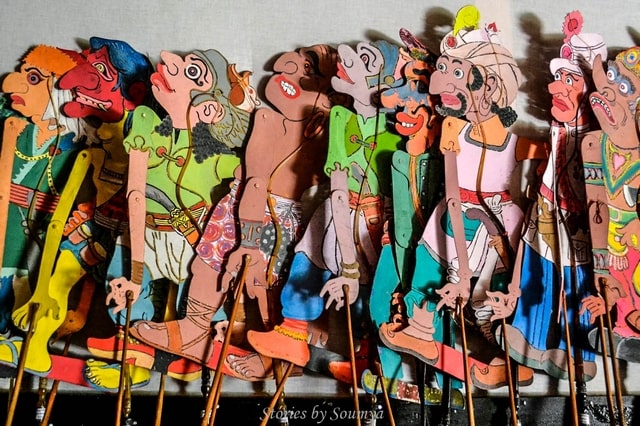
Wayang shows elsewhere in Indonesia
You can learn more about Wayang shadow puppets at Indonesia’s Wayang Museum, among the many interesting things to do in Jakarta. Google Arts & Culture has a virtual tour if you are keen.
Wayang Kulit plays are also pretty common in Yogyakarta. So if you are planning a trip to Yogyakarta, you can watch a show there too.
We can all help to promote this age-old art form by doing our little bit. Remember to watch a shadow play in Indonesia. Team it with the fascinating Kecak fire dance and you have the best cultural experience in Bali.

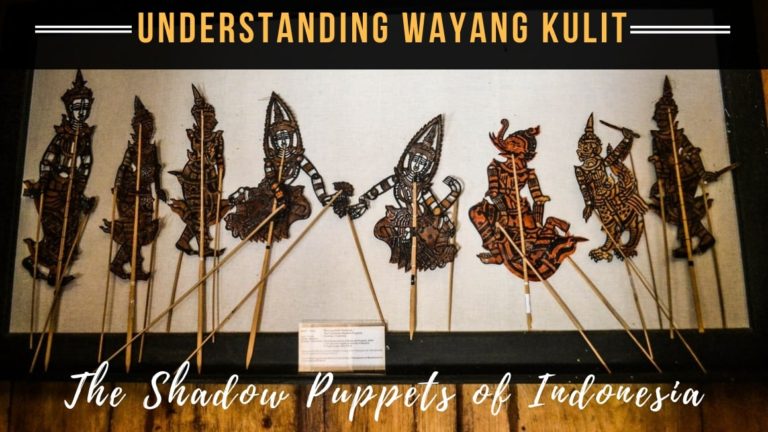
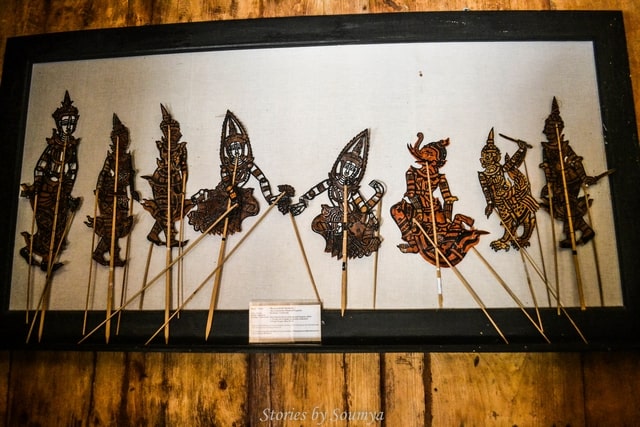

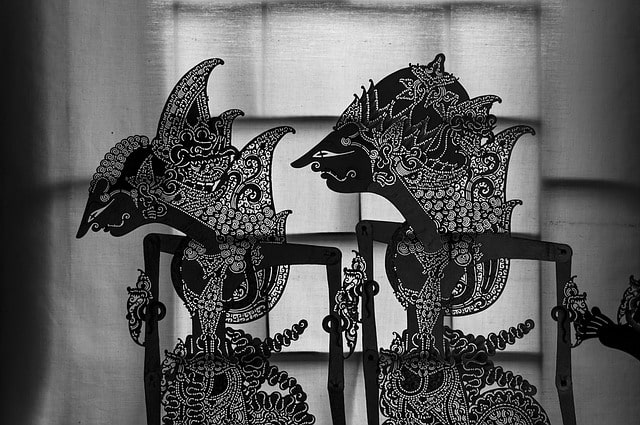
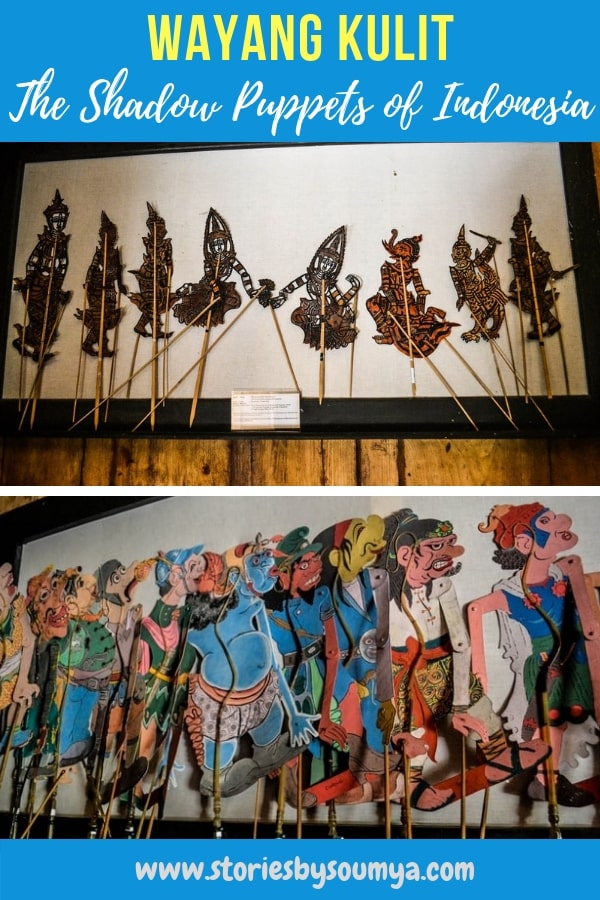
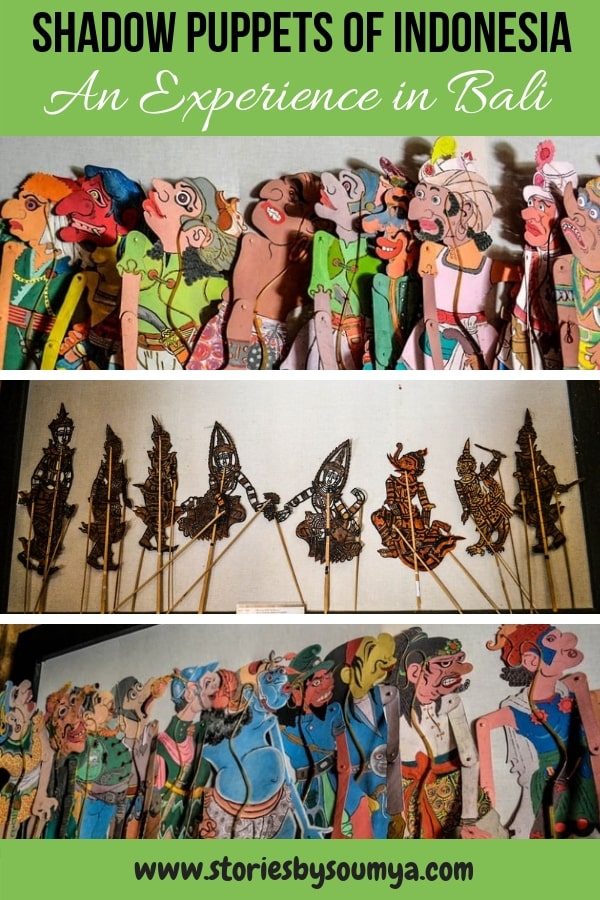
Hi !! I am Rekha Vyas storyteller and shadow puppeteer. Would like to buy puppets
Hi Rekha. Nice to see you here. Unfortunately, I don’t have contacts with the puppet sellers but you can always buy Wayang Kulit puppets on Amazon. And they are pretty easy to come by if you are traveling in Singapore, Malaysia, and Thailand apart from Indonesia.
This puppets look really interesting. I’ve heard about them before but didn’t really know anything about the origin and technical details and you explained it really nicely. Thank you for sharing
Thanks a lot. I am glad you liked it.
These puppets are such an interesting find of the many cultural practices of the country. I have always loved seeing the beautifully decorated puppets whenever I visit the desert state of Rajasthan. Wayang Kulit dolls look equally fascinating. I like the way they involve moral and traditional education into their storytelling framework, gives the art so much further depth as well!
That’s so true. They are not only a form of entertainment but the very embodiment of Indonesian culture and traditions.
The design and making of these puppets are so intricate, and very artistic. Plus, combining its story makes this a truly genuine art.
That is so true. A very interesting art indeed
Very nice! We used to enjoy—and even make—shadow puppets when we were children. We never knew that they are an interesting part of Indonesia’s culture until your post. Those puppets are intricate! I wonder how they look like when they are cast in front of a strong light source.
Yeah they are quite intricate which just shows the amount of effort that goes into building them. They look beautiful in front of a light source. You can check out some videos on YouTube if you are keen.
I had seen a set of Ramayana Wayang Kulit puppets in Malaysia some years back. I was really surprised to know that most performances are either of Ramayana or Mahabharata! Don’t know if I will get to see a performance, but I would love to visit Setia Darma!
In Malaysia? That sounds great. I might be traveling there this year may peep in. Setia Darma is beautiful. You will love it I am sure.
I am going to Bali this March and didntd really know about the shadow puppets. Definitely worth looking at while I am there.
You should definitely go if you like puppets or are interested to dig into the local culture. Worth a see.
I have been in Indonesia for 3 months and havent’ seen the shadow puppets. I saw the ads about it only in Bali, but I thought it’s something very touristic and didn’t go. From your article I see I should have gone. Looks interesting.
Wow! They are some very intricate puppets. I sounds like an awesome thing to see.
Yeah they are definitely an interesting part of a Balinese itinerary. I am sure you will love them.
Hi Soumya, I really enjoyed reading your comprehensive article on shadow puppets of Indonesia. As you mentioned, I too have seen puppets and story telling through puppetry. It’s really nice to see that the puppetry art and tradition is preserved and thriving in Indonesia. I can’t believe they have 5700 puppets in Setia Darma! They must have gathered them over centuries to have such an enormous collection.
Recently we saw some puppets in Jaisalmer, Rajasthan. They were 3-D puppet dolls, very well dressed in ornate Rajasthan outfits.
I am curious about the puppets in Rajasthan. Would love to check them out. India has always had a long tradition of puppets. I remember my grand mom brought in a few puppets/dolls to keep her company in the new household.
The Setia Darma museum is indeed amazing. Their collection is awesome